WordPress.org vs WordPress.com: We’ve Got Licenses For Both!
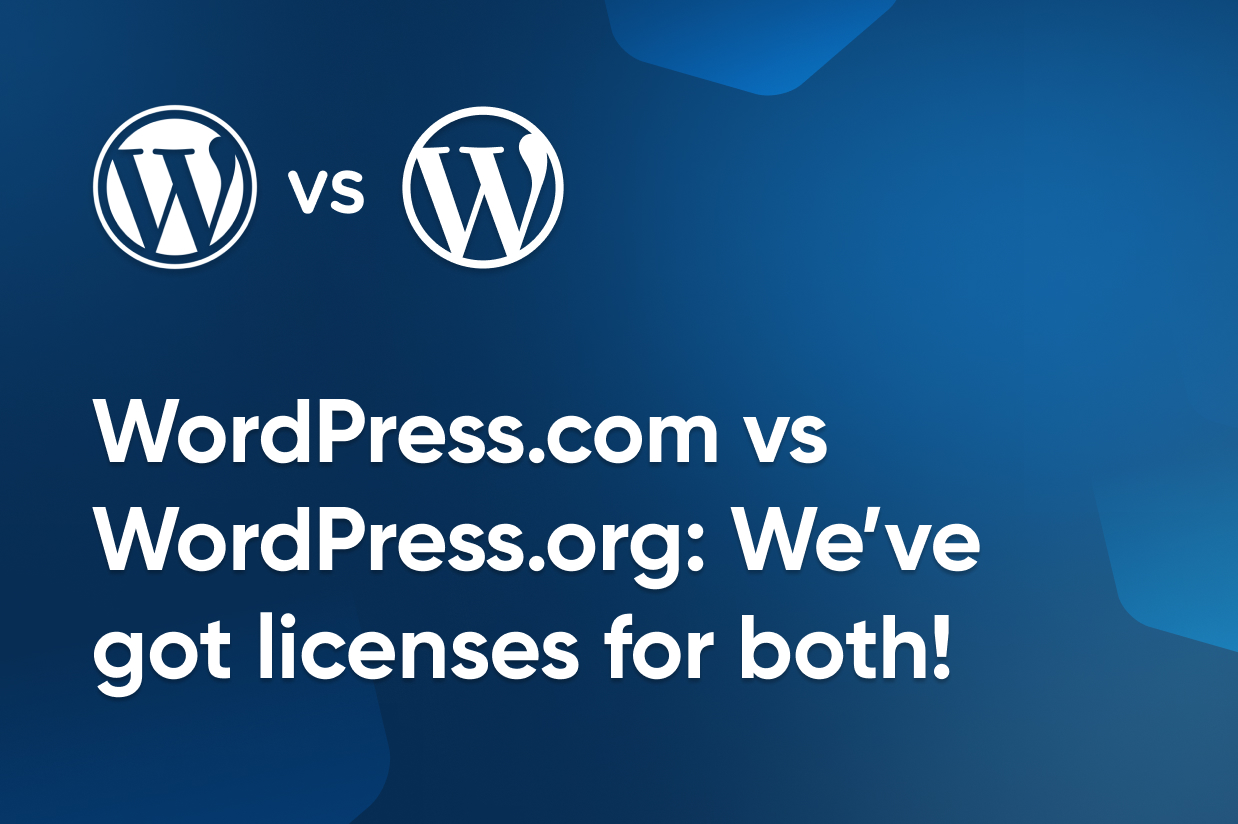
If you’re about to build a new website with WordPress, you have a big decision to make: WordPress.org or WordPress.com.
Both options are good, but which is best for you depends on your preferences and situation.
To help you decide, this WordPress.org vs WordPress.com comparison will explain the differences between both options, providing you with everything needed to make an informed decision.
Also, as both of these options have evolved and improved over the years, there are some common misconceptions and misunderstandings about the differences between WordPress.org and WordPress.com that this guide will clear up. This will ensure that you’re making a fully informed decision based on the current landscape.
But before we go any further, it’s worth highlighting one key point (that’s also covered in more detail in this article): You can install plugins on WordPress.com (Business plan and above) and purchase plugins, including Gravity Forms, directly from WordPress.com.
WordPress.org vs WordPress.com: What’s the Main Difference?
WordPress powers 43% of all websites, making it a popular, tried, and tested option.
However, every WordPress user has to decide whether to sign up at WordPress.com and build and host their site there or to sign up with a web host and set up a WordPress site in their own hosting account.
Hosted vs Self-Hosted
If you opt for WordPress.org, you’ll be using the version of WordPress that’s freely available from the WordPress.org website.
This approach is often known as self-hosted WordPress, and that’s how it will be referred to in this guide.
If you go to WordPress.org, you can download the WordPress software, but you can’t sign up and create your own site there. Instead, you must sign up with a web host, and then as part of that process, create a website that’s built with the WordPress software that’s available from the WordPress.org site.
If you go to WordPress.com, you can sign up and create your own site there. You’ll still be using the WordPress software, but it will be a different experience compared to going down the self-hosted route.
For example, signing up at WordPress.com and creating your site there does remove some of the steps involved in building a self-hosted WordPress.org site.
Also, as the service at WordPress.com includes hosting and domain name registration for your site, you don’t arrange that yourself.
Whereas if you decide to go down the self-hosted WordPress.org route, you’ll need to choose a suitable web host from the hundreds of options available. Depending on which host you choose, you might also need to register a domain name elsewhere.
So far, WordPress.com sounds pretty appealing. Simply go to their website, sign up, pay your money, and your new site will be online in a few minutes.
Case closed? Well, not quite…
Why Choose WordPress.org and Go Down the Self-Hosted Route?
The main advantage WordPress.org has over WordPress.com is freedom.
What sort of freedom?
Well, for one, you won’t be bound to the WordPress.com terms of service. However, you will have to stick to the rules of your chosen web host, but you’re free to choose a host that aligns with your values.
Also, with WordPress.com, you have to choose their third-most expensive plan (the $40/month if paid monthly or $25/month if paid yearly Business plan or higher) to unlock the ability to install themes and plugins – two of the main reasons to choose WordPress for your site.
With WordPress.org and the self-hosted approach, you can install themes and plugins regardless of which host you choose and how much you pay. Furthermore, you can find very cheap hosting plans that, while not be as good as the WordPress.com Business plan in terms of performance and features, can cost as little as a few dollars a month and might be good enough for your project.
With most hosts, taking the WordPress.org approach will also give you the ability to customize your site more heavily than you can with WordPress.com. This could include editing the WordPress software code itself or installing other scripts or apps on your hosting account.
All of that freedom requires a bit more time and effort than signing up with WordPres.com and letting them host your site, but for some readers, it might be worthwhile or necessary.
If the freedom to do more with your WordPress site and choose a plan that matches your budget is appealing, then self-hosted WordPress.org is probably the better option for you. But if not, WordPress.com is a solid choice.
WordPress.com vs WordPress.org: Which is Better Value?
WordPress.com offers a variety of plans, where with WordPress.org you can choose from numerous hosting services. The plans greatly differ in price, as do the features offered. Let’s find out more
WordPress.com Plans

WordPress.com has a free plan, which means you can get a website without spending a penny.
However, the Free plan has severe drawbacks, including having ads displayed on your site and an inability to use a custom domain name (you must use a WordPress.com subdomain such as http://mysite.wordpress.com).
The WordPress.com Personal and Premium plans are better in terms of limitations. Still, you’ll need to pay at least $25/month for the WordPress.com Business plan to get the true WordPress experience (or as close to it as is possible with WordPress.com), including the ability to install your choice of themes and plugins.
Therefore, if you’re serious about your site and getting the most out of WordPress, you shouldn’t really consider any of the WordPress.com plans below the Business plan.
WordPress.org Hosting Options
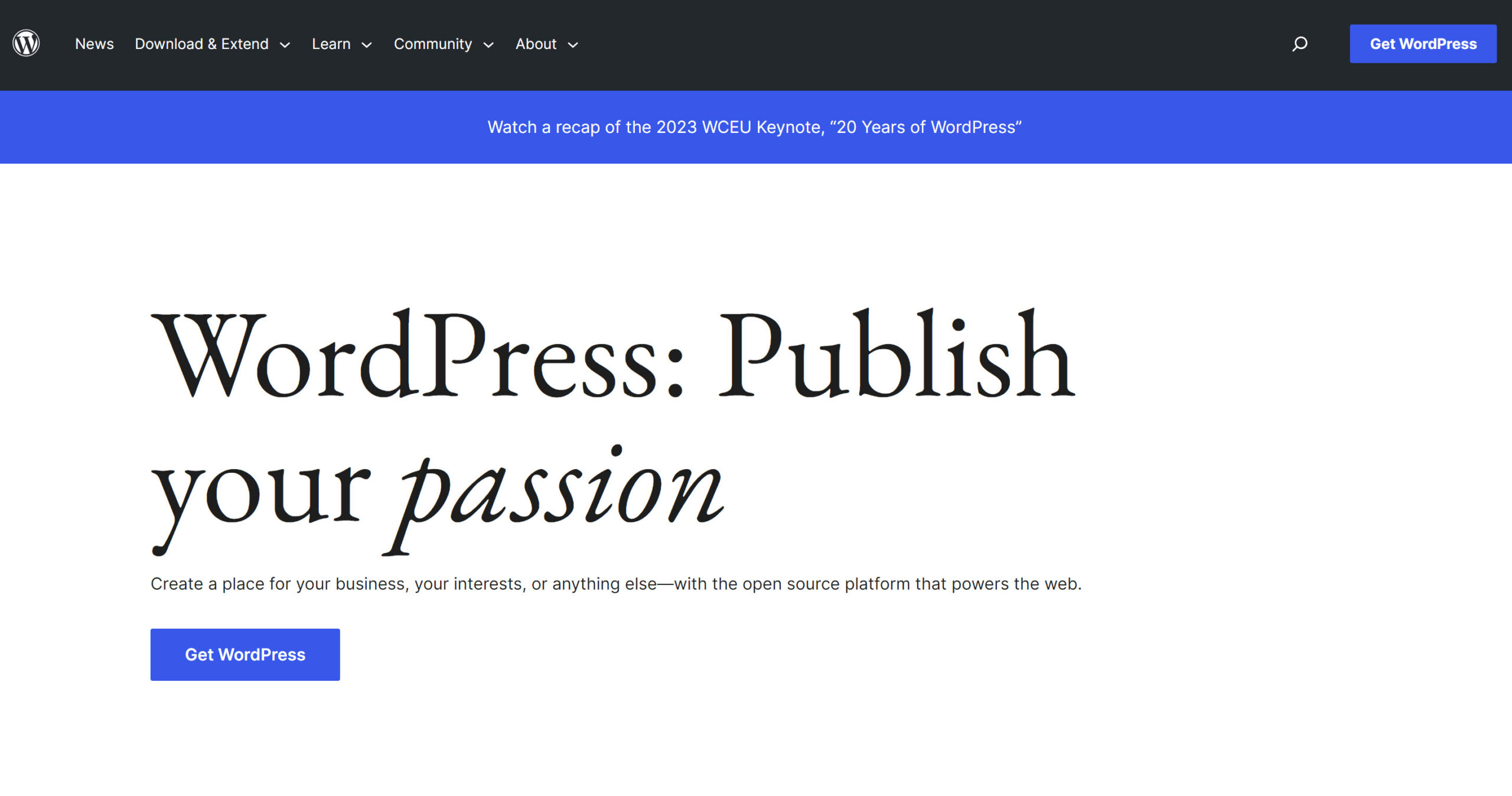
Over at WordPress.org, you can download and use the WordPress software for free. However, as mentioned, to get your site online, you’ll need to sign up with a web host.
This means there’s no free way to create a website with the WordPress.org approach. However, some cheap but good options exist, including the entry-level plans from DreamHost and SiteGround.
That said, compared to the WordPress.com Business plan, if you choose a cheap hosting plan for your WordPress.org site, you’ll miss out on some key features. Depending on which plan you choose, this could include fast load times, real-time automated backups, access to a library of premium WordPress themes, a global CDN, staging, and 200 GB of storage – all of which are features of the WordPress.com Business plan.
If you want to get a self-hosted WordPress.org experience that’s as close to the WordPress.com Business plan as possible, then you’ll need to sign up with a premium managed WordPress host rather than a low-cost shared hosting provider.
Most of the best premium managed WordPress hosts include many of the features you get with the WordPress.com Business plan. These include high performance, automated backups, security features, and staging. Plus, you get the freedom mentioned earlier that comes with choosing the self-hosted WordPress.org approach over WordPress.com
Some examples of these premium managed WordPress hosts include Kinsta, Flywheel, Nexcess, and WP Engine. Their prices range from around $13/month. You’ll also need to register a domain name too, something that you get for free for one year with WordPress.com Business plan (after the first year you’ll need to pay to renew the domain name, something you’ll have to do if you register a domain yourself when taking the self-hosted WordPress.org route).
If you’ve made a decision, your next step is to either sign up at WordPress.com or start looking for a company that can host your WordPress.org site for you.
If you’re still unsure, read on for more details on the differences between WordPress.org and WordPress.com.
WordPress.com vs WordPress.org: Other Points (and Myths) to Consider
The WordPress.com service has evolved and improved significantly over the years.
The same can be said for the self-hosted WordPress.org approach.
Some examples include now being able to heavily customize your site and install plugins and themes on some of the WordPress.com plans (Business and above). And with WordPress.org and self-hosting, you’ll find one-click WordPress installations, automatic backups, and excellent support have all become much more common.
Due to these changes, there are some outdated ideas and benefits in circulation about both options that are no longer true.
Here are some of them…
Lockin
One concern you might have when deciding between WordPress.org and WordPress.com is whether you’ll be locked into either option and unable to switch later.
That’s definitely a valid concern, but it’s much less of an issue now than it used to be.
People used to say that with WordPress.com, you’re just renting your site or online presence. This was because, unlike the self-hosted WordPress.org approach, you don’t have access to the underlying files and database that make up your site’s design, configuration, and content.
Due to this, you couldn’t really move your site or all of its content to a new self-hosted home, away from WordPress.com. You were effectively locked into WordPress.com for life.
While that might’ve been true to some extent in the past, now, though, that’s not the case.
If you’ve chosen a WordPress.com plan that supports plugins, such as the Business plan or above, you can migrate your entire site to a new web host and switch to a self-hosted WordPress.org site.
In fact, most good hosts will take care of site migration for you or at least provide you with tools that make the process almost fully automated.
You can also go the other way and move from self-hosted to WordPress.com.
There is one potential issue, though.
If you started with WordPress.com and have bought premium plugins via the WordPress.com plugin directory, you won’t be able to migrate those licenses with your site to your new WordPress.org self-hosted configuration. Instead, you’ll have to purchase the licenses separately, usually directly from the plugin provider.
If you’re moving the other way, from WordPress.org to WordPress.com, and you have purchased premium plugins or themes, then there shouldn’t be a problem moving those purchases across to the new site (as long as you choose a plugin-enabled WordPress.com, such as Business or above).
There might also be a few other perks of the WordPress.com plans that you’ll have to give up if you move to a self-hosted WordPress.org solution, such as real-time backups. However, you can usually add these back in by installing additional plugins or choosing a host that also provides them.
Responsibility for Site Maintenance
One great thing about WordPress.com is that you don’t have to worry about keeping the WordPress software up to date – all of that is taken care of for you.
You also don’t have to worry about your hosting environment being fully compatible with or optimized for WordPress. This is because the WordPress.com hosting environment was built specifically for hosting WordPress sites and nothing else.
In the past, the self-hosted WordPress.org situation wasn’t this WordPress-friendly.
Nearly all, if not all, web hosts used to let customers host any type of site on their plans and not just WordPress sites. Because the hosting environment had to cater to a wide range of sites that a customer might want to build, it wasn’t optimized specifically for WordPress in terms of security and performance
These hosts often wouldn’t take care of things like WordPress software updates, site backups, and migrations for you or provide you with the tools to simplify those tasks. Their support staff might not have had much WordPress experience. Due to this, you had a lot of responsibility for keeping your site safe and secure, online, running smoothly, and loading quickly.
Now, though, you can find many high-quality hosts that only host WordPress.org sites or at least have plans that are designed specifically for WordPress users. Due to this, they’re able to create an environment that’s optimized specifically for WordPress. These managed hosts will also keep the WordPress software up to date for you, automatically back up your site each day, and have support staff who are true WordPress experts.
Today, if you choose a high-quality managed WordPress host for your self-hosted WordPress.org site, the whole experience can be very hands-off. It probably won’t be as hands-off as WordPress.com, but it will be very close.
Even if your budget doesn’t stretch to premium managed WordPress hosting, you can still find cheap WordPress-focused plans that take most of the responsibility of looking after your site off your hands.
Freedom
As mentioned earlier, you can get more freedom by choosing self-hosted WordPress.org over WordPress.com, even if you opt for one of the plugin-enabled WordPress.com plans.
With WordPress.com, there are some plugins you aren’t allowed to use. In most cases, the features of these plugins are available on the WordPress.com plans, so you aren’t really missing out. But that’s not the case for all of them.
However, some companies that host WordPress.org sites also have lists of prohibited plugins. Therefore, if there’s a specific plugin you really want to use, be sure to check it’s allowed.
Also, self-hosted WordPress.org solutions tend to be more developer friendly than WordPress.com. For example, some hosts will let you change the PHP version in use, configure the caching yourself, or change the WordPress code itself.
Ease of Use
In most cases, WordPress.com is easier to get started with and use.
That’s not to say a self-hosted WordPress.org site is a lot more challenging to get to grips with, it’s just that WordPress.com has done a great job of walking you through the setup process and providing you with everything you need in one place.
However, some companies that let you self-host a WordPress.org site have created their own solutions to simplify creating and managing WordPress sites. SiteGround and WP Engine are two examples.
A More Curated Experience
Using WordPress in general, can be overwhelming, especially for those who are new to the sphere.
When it comes to choosing a design for your site and adding new features, there are 100,000s of themes and plugins available. Then there are all the customization options and settings accessible from your WordPress dashboard.
If you opt for WordPress.com over a self-hosted WordPress.org site, some of those options are limited, helping to reduce decision fatigue and overwhelm.
For example, if you choose one of the plans below the plugin-enabled Business plan, you won’t have to decide which plugins to install to add new features to your site, as it’s not possible to do so. When choosing a design for your site, the theme selection is much more limited.
Even if you choose the plugin-enabled WordPress.com Business plan or above, you’re not left to fend for yourself when it comes to selecting plugins. Now that WordPress.com has its own premium plugin directory to accompany the existing theme marketplace, you can confidently browse the selection, safe in the knowledge that they’re all reputable options that the WordPress.com team has vetted. There’s no such safety net when you’re buying plugins from third-party developers out in the wild.
If you ever suffer from analysis paralysis, the curated approach of WordPress.com can narrow your options and make it easier to come to a decision.
Suppose the curated approach doesn’t appeal to you. In that case, you’re still free to find your own plugins and themes that are available outside the WordPress.com directories, provided you’ve chosen the plugin-enabled Business plan or above.
WordPress.org or WordPress.com: Which One Should You Choose?
The good news is if you want to build a fully functional WordPress website, both WordPress.org and WordPress.com are great options. And remember, you can migrate your site between WordPress.com and WordPress.org if you need to, so your decision isn’t final.
But if you want to get up and running as quickly and easily as possible and you don’t mind forgoing a bit of freedom, signing up with WordPress.com is an excellent option. However, I’d skip all of their plans apart from the plugin-enabled Business plan and above.
The WordPress.com Free, Personal, and Premium plans are fine if you just want to get a basic idea of what using WordPress is like, but you’re not getting the true WordPress experience.
The WordPress.com Business plan isn’t cheap, though.
For some readers, opting for a less expensive managed WordPress host, such as Flywheel, Nexcess, or WP Engine, can deliver comparable features and levels of performance at a lower price.
Then, for those of you who want the least amount of constraints over what you can do with your site and how much you can customize it, the WordPress.org self-hosted route will be the best option.
For most people, though, WordPress.org wins on budget and freedom, while WordPress.com wins on convenience and ease of use.
Either way, you probably won’t be disappointed; if you are, you can always switch.
Gravity Forms: Available on Both WordPress.org and WordPress.com
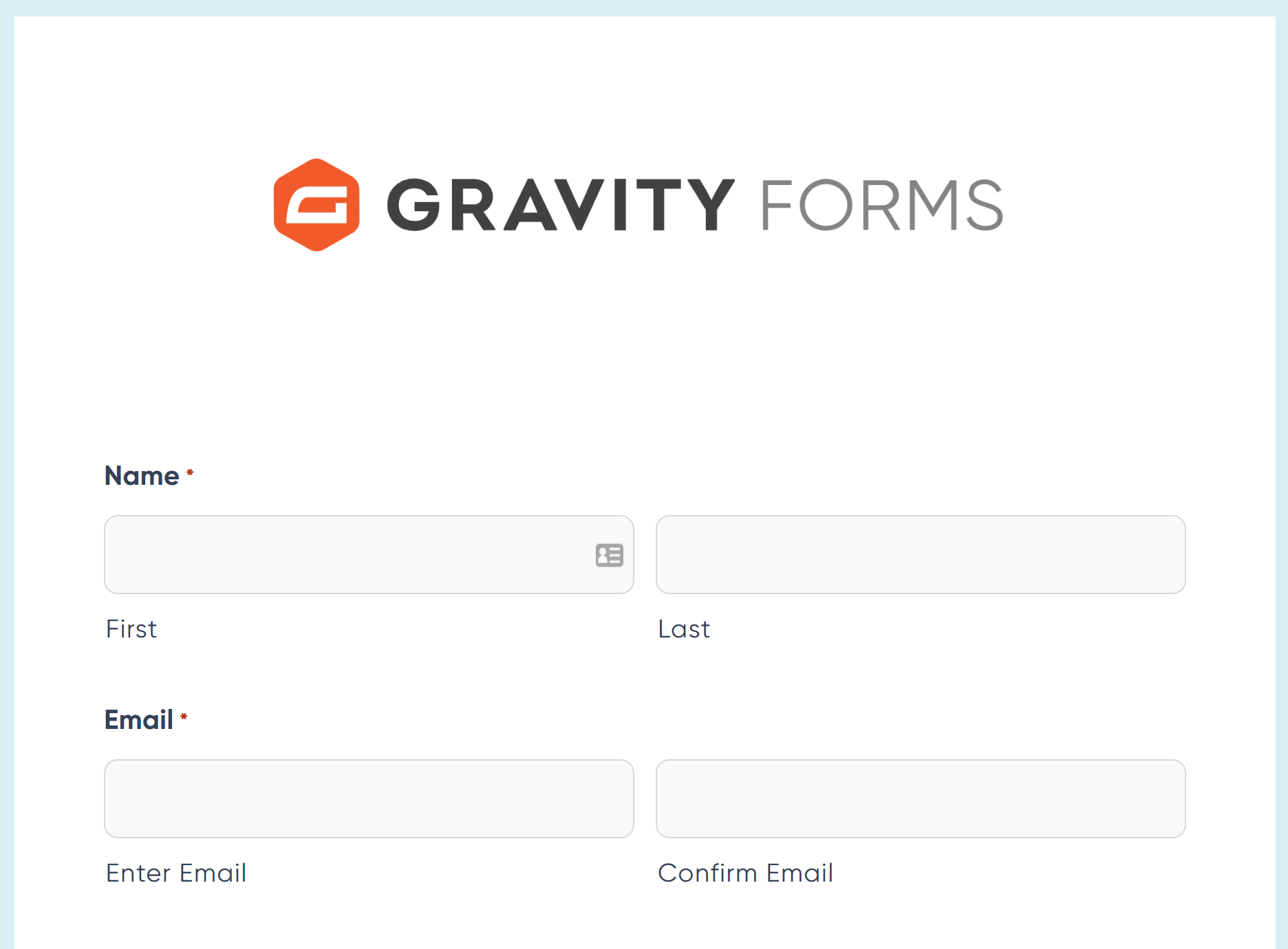
Whether you end up with a WordPress.org or WordPress.com website, you’ll need to use a form plugin to help you engage with your site visitors and capture the data your business needs.
Gravity Forms is the #1 form builder for WordPress and is renowned throughout the industry for its robust security and reliability. Trusted by businesses and nonprofits around the globe, with Gravity Forms you can collect leads, accept payments, run surveys and quizzes, build complex custom forms, and much much more.
Importantly, Gravity Forms is available on both WordPress.org and WordPress.com, and we’ll discuss the license options shortly.
But first, here’s an overview of the top features you can expect from our WordPress form plugin…
- Ease of Use – Our user-friendly drag-and-drop form editor and intuitive form template library enables you to create forms within minutes, no coding required!
- Built-in Features – Gravity Forms has a wide assortment of built-in features and functionality, available to all our customers whatever license type you choose. Features include conditional logic, multi-page forms, file uploads, and much more, enabling you to create professional custom forms that appeal directly to your specific target audience.
- Countless Integrations – Gravity Forms supports numerous add-ons to enhance and extend your forms. Integrate your forms with an email marketing provider or CRM to help manage leads, sync Gravity Forms with a payment processor and start accepting payments on your site, create polls, quizzes, and surveys for your website visitors, or connect with Zapier to gain access to thousands of further third-party services and apps.
- Accessibility – With Gravity Forms it’s never been quicker or easier to create accessible forms. With extensive accessibility features and documentation, you can build forms that are WCAG 2.1 AA compliant, helping to ensure your website is available to all!
- Documentation and Support – With extensive documentation, and our friendly expert support team always standing by, it’s easy to get the help you need whenever you need it.
For more information on Gravity Forms, check out this article – Gravity Forms Review: Helping You Choose the Best WordPress Form Plugin in 2023.
Gravity Forms Licences: WordPress.org
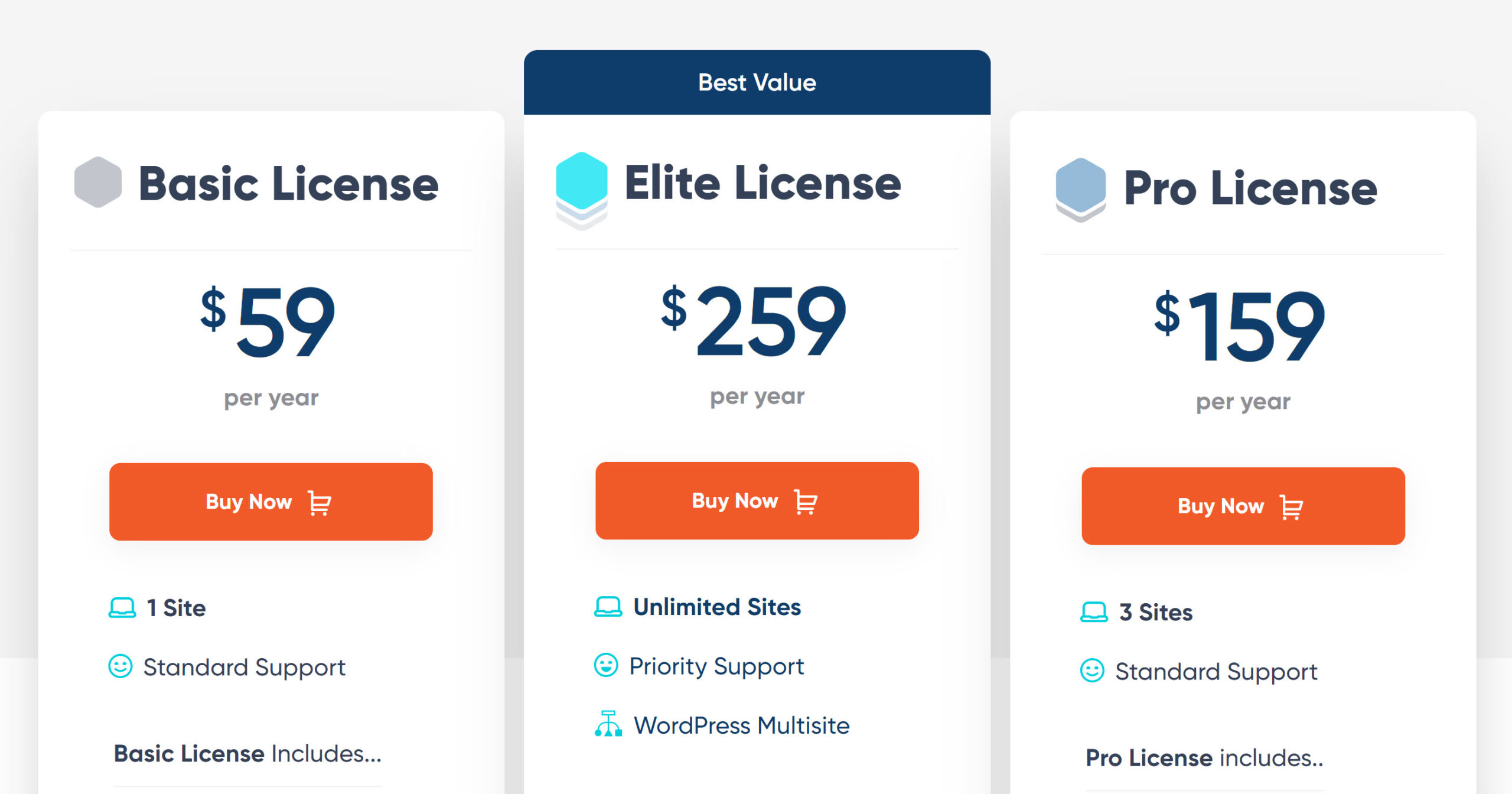
If you decide to opt for WordPress.org, then we have multiple Gravity Forms license options, each providing different levels of functionality – this allows you to choose the license that meets your budget and project requirements.
Here’s a quick summary of our three license types…
- Basic License $59 a year: If you’re looking to grow your email list, then the Gravity Forms Basic License is for you! Perfect for personal projects and/or blogs, this plan includes licensing for one site, standard support, multi-page forms, file uploads, and Basic Add-Ons such as Mailchimp, Active Campaign, HubSpot, and more!
- Pro License $159 a year: A best fit for anyone running an online business and/or accepting payments via a WordPress website, this plan includes licensing for three sites, standard support, multi-page forms, file uploads, and Basic & Pro Add-Ons such as Stripe, PayPal, Zapier, and more!
- Elite License $259 a year: Gain full access to Gravity Forms with the Elite license – great for ambitious entrepreneurs, agencies, and other users who need to use the plugin on a large number of sites and require vast functionality. This plan includes licensing for unlimited sites, priority support, multiple page forms, and file uploads, as well as Basic, Pro, and Elite Add-Ons such as User Registration, Surveys, Quiz, and more!
- NonProfit License $129 a year: Our Nonprofit license is perfect for registered nonprofits that need a comprehensive data capture solution. With access to all built-in features, all current add-ons, updates, support, and licensing for three sites, our Nonprofit license will enable you to collect leads, accept donations, run surveys and quizzes, and much more! Apply Today!
For more information on the licenses available for WordPress.org sites, and to compare the plans, check out our Pricing page.
Gravity Forms WordPress.com License
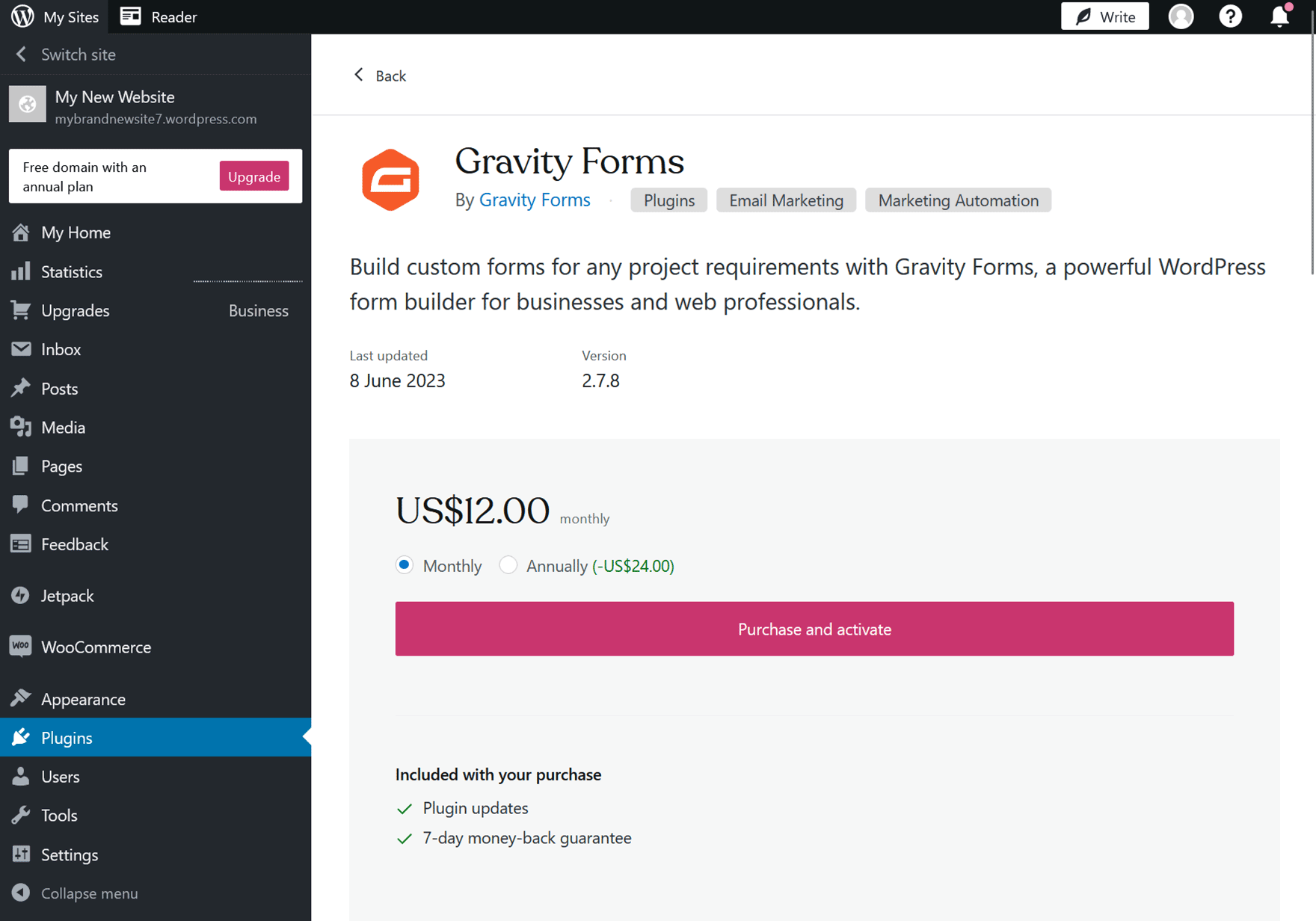
If you choose to run your site through WordPress.com then you can buy Gravity Forms via the WordPress.com premium plugin marketplace. Simply head on over to your WordPress.com plugin page, where you can purchase Gravity Forms directly through your dashboard.
Here’s what’s included in the Gravity Forms WordPress.com license…
- Unlimited forms and entries
- Automatic updates
- Access to all Gravity Forms’ built-in features
- Access to our library of official Gravity Forms Add-Ons
- Email support
The license will set you back $12 a month or $120 annually (and of course you’ll need to be using a WordPress.com Business plan or above).
For more information on this license, check out the Gravity Forms WordPress.com license page.
Get started with WordPress.com and Gravity Forms today.

If you want to keep up-to-date with what’s happening on the blog sign up for the Gravity Forms newsletter!